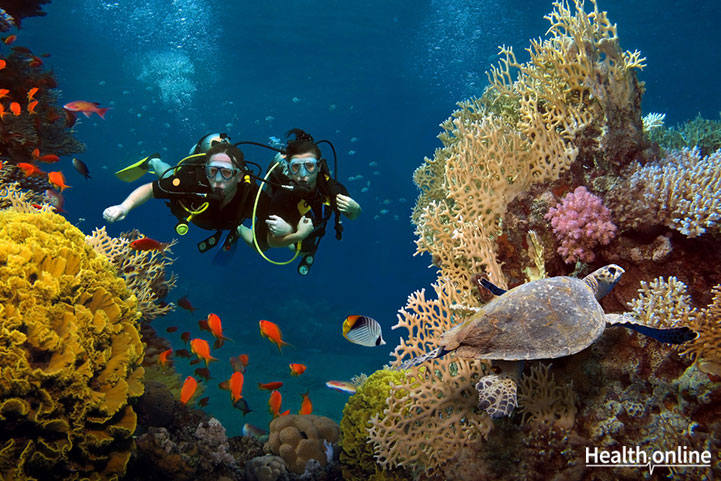
Health Risks of Scuba Diving (and How to Avoid Them)
Hearing the words “scuba diving” can bring an adrenaline rush in your system, as eagerly contemplate the thrill and excitement associated with the sport. Scuba is an acronym derived from ‘Self-Contained Underwater Breathing Apparatus.’ However, if you intend to scuba dive without lessons and practice, it can be dangerous.
The dangers associated with scuba diving are very high in comparison to other sporting activities. If you are not a typical adrenaline junkie, and new to water sports, then you should get proper training from a professional. Attend scuba diving lessons, become aware of scuba diving safety tips, and own the necessary scuba diving gear before you (quite literally!) take the plunge.
Recommended Read: Water Safety and International Travel
Risks of Scuba Diving
No matter how experienced you are, you need to always be prepared for any dangerous situation. Most companies will not allow you to scuba dive if you do have the requisite certification. To enjoy the sport safely, you need to undertake proper training from a professional instructor.
There are many situations, wherein simple scuba diving techniques can fail owing to lack of precision in determining depths of water. Some of the common risks are:
- The most obvious risk of scuba diving is, of course, the risk of drowning. So, it’s important that there is someone to assist you in case something goes wrong.
- You can feel dizzy and disoriented, which generally indicates unbalanced pressure in the inner ear. Headaches are quite common. Some frequent divers also get bone lesions, caused due to regular exposure to the high-pressure environment.
- You can also face a serious lung expansion injury if you hold your breath when ascending. Other common injuries can be caused when divers touch underwater species such as jellyfish, stingrays, and fire coral.
- Always keep a lookout for any potentially dangerous aquatic creatures. Make enquiries regarding the probability of encountering such creatures beforehand.
- If you experience fatigue and your judgment is impaired, then it could be the early signs of hypothermia, which is a loss of body heat leading to a feeling of extreme cold in deep waters.
- When you arrive at the surface after the dive, do not tread a rapid ascent, as it can lead to a variety of medical conditions. Sometimes divers get panic attacks when their masks flood with water. Do exercise caution at all times.
Recommended Read: How to Deal with Sea Sickness
Scuba Diving Safety Tips
Even if you are an expert in scuba diving, you cannot take safety and precautionary measures for granted. Not following them is equivalent to risking your life.
- Check your equipment thoroughly. The scuba diving gear should not malfunction when you’re underwater at any cost. While purchasing your scuba diving gear and equipment, make sure everything fits properly and comfortably.
- Along with scuba diving gear, you will need to have a BCD (buoyancy control device), air cylinder, regulator and weight system.
- The diving regulator should be equipped with a spare oxygen valve, commonly referred to as the Octopus. Look for a reliable brand when choosing the scuba diving gear, to stay anxiety-free during your underwater adventures.
- Scuba diving lessons from a professional instructor should guide you on the breathing techniques and methodologies to be followed when underwater, as well as tips on how to resurface.
- Familiarize yourself with the cylinder weight and breathing frequency. You may also want to consider including a dive flag and float in the list of scuba diving equipment.
- Only perform dives that you are trained to perform.
If you want a fun and safe scuba diving experience, familiarize yourself with all the aforementioned scuba diving safety tips. Happy Diving!
Keep yourself updated with the latest on Travel Health . Like us on Facebook and follow us on Twitter for more on Health , Diet & Nutrition and Fitness . Also, check out our Health Tools and try out our health-related Quizzes .




